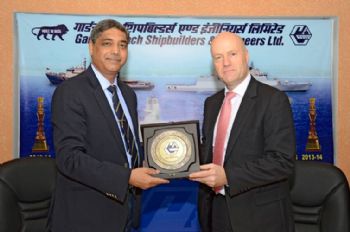
Rolls-Royce and Kolkata-based Garden Reach Shipbuilders & Engineers Ltd (GRSE) have signed a deal to assemble MTU 4000 engines in India.
The V12 and V16 4000 M90 engines will be assembled at GRSE’s diesel engine plant in Ranchi (an option for the local production of parts in the future was also agreed).
The engines will be installed in various naval vessels built by GRSE, which is one of India’s leading shipyards and part of the Indian Ministry of Defence. MTU is a brand of Rolls-Royce Power Systems.
VK Saxena, managing director of GRSE, said: “This agreement strengthens our long-standing and successful partnership with MTU. It is an important contribution to our indigenisation programme, in line with the government’s Make in India strategy. We plan to achieve 40% indigenous content progressively for MTU 4000 engines.”
Praveen Mohan, CEO of MTU India, said: “We are delighted to continue and deepen our co-operation with GRSE. MTU has demonstrated its commitment to India as a location for business and investment for many years through the Engineering & Research Centre and Global Purchasing Office based in Pune, as well as earlier licence agreements with GRSE. We look forward to making further engines in India.”
Meanwhile, Rolls-Royce has won a contract from Förde Reederei Seetouristik (FRS) — a shipping group based in Flensburg, Germany — to supply four 16-cylinder MTU 4000 engines and four Kamewa S71 water-jets.
The engines will power a 56m-long all-aluminium catamaran that will be constructed by the Australian shipyard Austal and will then operate (from next spring) on the River Elbe, as well as between Helgoland and the Port of Hamburg.
Jan Kruse, CEO of Förde Reederei Seetouristik said: “We were very impressed by the extended maintenance intervals of the MTU 4000 engines, combined with an excellent power-to-weight ratio and the low fuel consumption — and their dynamic acceleration, of course.”